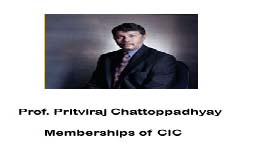Senior Lecturer
BSc(Hons) Calcutta, PGDM XLRI Jamshedpur, PhD Texas
Austin
Research
interests
Organizational demography; managerial cognition; effects of
employment externalization; and organizational responses to
threats.
Significant
publications
*
Chattopadhyay,
Prithviraj;
George, Elizabeth. (2001)
Examining
the effects of work externalization through the lens of social identity theory
Chattopadhyay,
Prithviraj;
Glick, William; Huber, George. (2001)
Organizational
actions in response to threats and opportunities
Journal Article in Academy of
Management Journal
Chattopadhyay,
prithviraj.
(1999)
Beyond
direct and symmetrical effects: The influence of demographic dissimilarity on
organizational citizenship behavior
. Journal Article in Academy of
Management Journal )
Chattopadhyay,
Prithviraj;
glick, william; miller, chet; huber, george. (1999)
Determinants
of executive beliefs: Comparing functional conditioning and social influence
.
Chattopadhyay, P.,
George, E., & Lawrence, S. Forthcoming. Why does dissimilarity matter?
Exploring self-categorization, self-enhancement and uncertainty reduction.
Journal of Applied Psychology.
Chattopadhyay, P., Tluchowska, M., & George, E. Forthcoming.
Identifying the in-group: A closer look at the influence of demographic
dissimilarity on employee social identity. Academy of Management
Review.
Chattopadhyay, P. 2003. Can
dissimilarity lead to positive outcomes? The influence of open versus
closed minds. Journal of Organizational Behavior, 24:
295-312.
Chattopadhyay, P. &
George, E. 2001. Examining the effects of work externalization through the
lens of social identity theory. Journal of Applied Psychology, 86:
781-788.
Chattopadhyay, P., Glick,
W.H., & Huber, G.P. 2001. Organizational actions in response to
threats and opportunities. Academy of Management Journal, 44: 937-955.
Chattopadhyay, P. 1999. Beyond
direct and symmetrical effects: The influence of demographic dissimilarity
on organizational citizenship behavior. Academy of Management Journal, 42:
273-287.
Chattopadhyay, P., Glick,
W.H., Miller, C.C., & Huber, G.P. 1999. Determinants of executive
beliefs: Comparing functional conditioning and social influence. Strategic
Management Journal, 20: 763-789
Beyer, J.M., Chattopadhyay, P., George,
E., Glick, W.H., Ogilvie, d., & Pugliese, D. 1997. The selective
perception of managers revisited. Academy of Management Journal, 40:
716-737.
Current teaching
activities
MBA
Leadership: Concepts and Skills
Strategic Human Resource
Management
Contact
details
Tel: +61 2 9931
9571
Fax: +61 2 9662
7621
Email: prithvic@agsm.edu.au
Support contact details
Peggy
Leung
Tel: +61 2 9931
9420
Fax: +61 2 9931
9326
Email: peggyl@agsm.edu.au
